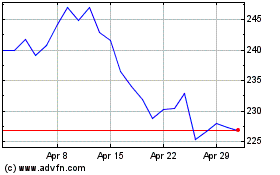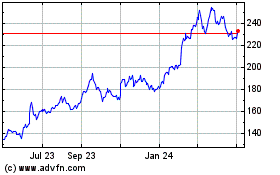Ford to Exit Indonesia, Japan
January 25 2016 - 7:50AM
Dow Jones News
TOKYO—Ford Motor Co. will cease all operations in Indonesia and
Japan by the end of 2016 because it doesn't expect to achieve
sustainable profitability in the two markets, the auto maker said
Monday.
Ford, the second-largest auto maker in the U.S.—which has a 0.1%
market share in Japan and a 0.6% market share in Indonesia—will
close all offices and dealerships in the two countries, spokeswoman
Karen Hampton said.
"It has become clear that there is no path to sustained
profitability, nor will there be an acceptable return over time
from our investments in Japan or Indonesia," Ford spokesman Neal
McCarthy said, adding that Asia Pacific President Dave Schoch
notified all employees in the region on Monday about the decision
by email.
Ford's move highlights U.S. car makers' struggle to make
significant inroads in major Asian auto markets dominated by
Japanese auto makers including Toyota Motor Corp.
In Japan, domestic brands account for more than 90% of the
new-vehicle market. Ford, which has been selling cars in Japan for
more than four decades, sold 5,000 vehicles there in 2015.
Auto demand in Japan, facing an aging and shrinking population,
is expected to decline in the coming years and Ford's chances for
success are shrinking, Ms. Hampton said. Ford has 52 dealership
outlets and 292 employees in Japan, she said.
In 2002, Ford started selling vehicles in Indonesia, Southeast
Asia's most-populous country, where Japanese auto makers hold about
90% of market share. But it had no local production and didn't
offer vehicles in popular segments such as multipurpose vans, Ms.
Hampton said. Ford's retail sales in Indonesia fell to 6,103
vehicles last year from 11,614 in 2014. Ford has 44 outlets in
Indonesia and 35 employees there, Ms. Hampton said.
Ford's move comes as some auto makers are revamping struggling
operations in the region. Last year, General Motors Co. decided to
shut its Indonesian assembly plant and shifted its strategy,
teaming up with a Chinese joint-venture partner, SAIC Motor Corp.,
to build and sell minivans there.
Auto makers, including Ford, are also making sure they have
enough resources to meet tighter emissions regulations and expand
into new business fields such as autonomous cars.
The Asia-Pacific region will continue to be a significant region
for Ford, which sells around 6 million vehicles a year world-wide,
Ms. Hampton said. In China, the world's biggest auto market, Ford
sold 1.1 million vehicles in 2015, up 3% from a year ago, she
said.
Ben Otto contributed to this article.
Write to Yoko Kubota at yoko.kubota@wsj.com
(END) Dow Jones Newswires
January 25, 2016 07:35 ET (12:35 GMT)
Copyright (c) 2016 Dow Jones & Company, Inc.
Toyota Motor (NYSE:TM)
Historical Stock Chart
From Jun 2024 to Jul 2024

Toyota Motor (NYSE:TM)
Historical Stock Chart
From Jul 2023 to Jul 2024
